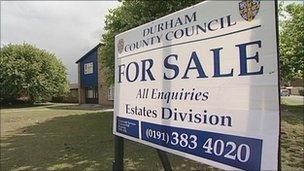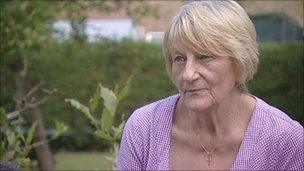Should councils reopen care homes for older people?
- Published
- comments

The care home which used to house Ann Dryden's mother was closed by the council and is now up for sale
Last year was a tough one for Ann Dryden and her mum Emeline.
Durham County Council , externaldecided it had to close Shafto House - the local authority care home that Emeline lived in.
Ann and other relatives campaigned against the decision, but to no avail.
What followed was a traumatic move. Emeline is in her 90s.
The good news was that she found another home in her native town of Newton Aycliffe with some of her friends from Shafto House. She has now settled in.
But the bad news - the home belongs to Southern Cross.
Private business
Given the financial problems facing the company, Ann Dryden says all the worry has begun again.
She said: "I must stress my mum's taken very good care of in the home she's in, but it's like any business. It's a private business and it's for profit.
"Once the profits go, how do they manage the care, will it be the same? It's just worrying. I can't think what would happen if she had to move again. She's 93 now and quite frail."
Ann Dryden feels particularly let down by the county council.
She says her and other campaigners warned councillors that closing the homes would leave vulnerable older people relying on the private sector.
She takes no pleasure in feeling vindicated.
But as the Southern Cross crisis has demonstrated, while councils have a responsibility to find care for older people, they don't have to provide homes themselves.
Declining demand
And it's not just Durham which has been closing its local authority homes. In fact, it's one of the last councils in the North East to still have any.
Only Cumbria, external and North Yorkshire, external County Councils still have significant numbers of their own care homes.

Ann Dryden believes councils are letting older people down by placing their care in the hands of private companies
Councils say there has been declining demand for places as more older people choose to stay in their own homes.
But there is also some economics at play.
Durham County Council says it was costing the authority up to a £1,000 a week to place an older person in its own homes.
In contrast, private care homes would charge the council a maximum of £480 to house the same client.
Social enterprises
Closures then also seem to make financial sense.
And despite the Southern Cross crisis, it doesn't look like we'll suddenly see local authorities rushing to reopen homes.
But Cllr Nick Forbes, the leader of Newcastle City Council, external, does believe there needs to be change in the sector.
He wants to see not-for-profit charities and social enterprises encouraged to run care homes instead of private operators intent on making money.
But some private providers say any care crisis won't get any better unless councils take their responsibilities to older people more seriously.
They don't want to see them opening homes, but would like councils to pay fully for the cost of caring for the older people housed by the private sector on their behalf.
More money
Wellburn Care, external runs 14 homes across the North East and Yorkshire. Its chairman, Simon Beckett, says councils have been freezing or cutting payments to homes to save money.
He said: "Councils are setting a fee rate which is picked out of the air to suit their budget. It doesn't relate to the costs and margin necessary to do the job properly.
"In a 40-bed home with a third of people suffering from dementia, the underpayment can be more than £100,000, and that's a lot of money for one individual home to be short of."
Age UK, external says councils and the government need to find more money to rescue the care system from crisis.
It estimates that the government will be spending less on caring for older people in 2014, than was being spent in 2004. It says another £2bn to £3bn needs to be spent to prevent the system collapsing.
The Politics Show will be debating the future of care for older people at 11am on BBC1 on 26 June.